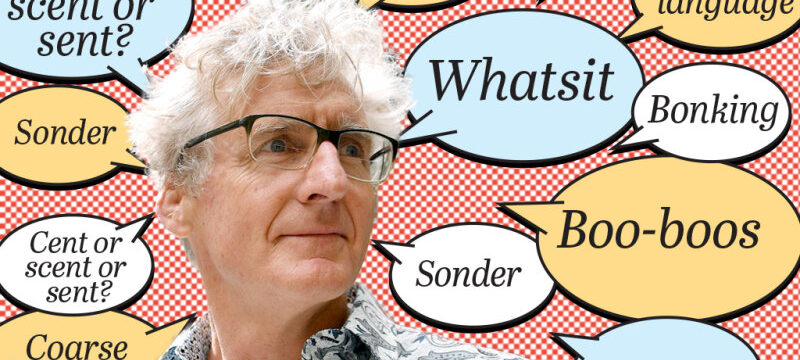Save articles for later
Add articles to your saved list and come back to them any time.
Letterboxes seem tailor-made for bills and referendum flyers – unless you write a word column for a living. Over winter I received an Egyptian doorknob-hanger, a Tyrolean reprimand, a 1919 novel written by a nine-year old, plus a punctuation poem.
We begin in the Old Cataract Hotel, that doorknob’s oasis. Linda Stern, a Wordplay reader, splurged on a night’s stay, just to soak in the pharaoh-chic of Nile vistas, the cocktail terrace, plus the fancy doorknob-hangers. English appeared on one side, outlining house rules, and pseudo-Latin on the other:
“Lorem Ipsum Dolor Sit Amet…” Yes, the dummy script I featured in July, now presumed “by the Arabic-speaking staff to be just another weird and wonderful European language,” as Linda wrote. There in full pomp and futility, dangling in Aswan.
If you write about language, you’ll cop language in return, writes David Astle.Credit: Jo Gay
As for my Tyrolean tsk-tsk, the sender was Merran Loewenthal, a reader traipsing the Austrian Alps. For it’s Austria, as Merran kindly noted, where you’ll find the Tyrolean Alps. This is despite my recent claim that homesick Swiss mercenaries, fighting abroad in the 1700s, missed “their homes in the Tyrolean Alps.” Right mountain chain, wrong atlas page, underscoring the tyro in Tyrolean.
Fact: if you write about language, you’ll cop language in return, via mail and emails. Most days I relish the deluge, though it’s tricky to reply in good time or find the right column to share the miscellany. Neologisms thrive, such as “squilometre”, coined by David Maher: “Squilometre comes from two words, square and kilometre, it refers to the amount of land impacted or rendered unusable by sea level rise, due to global warming.”
As for language gaps, one (anonymous) pen-friend sought the collective noun for pimples. Online offerings ranged from pustulence to pimplex, from pizza to squeeze, eruption to blush – though data analyst Steve Wilson won the gong with “zituation”.
Keeping with the body, Val Britton didn’t need a new word but a better one. In recent months, Val has undergone cancer treatment. “Before the chemo I was warned about the possibility of numerous undesirable side-effects. Luckily, I didn’t experience any. In fact, I had a lucky side-effect when my hair went curly! I’ve since been wondering whether there’s a verb we can use instead of warn, one with a positive connotation?”
Val’s own suggestions embraced alert, or advise – perhaps the two best options English can muster. Advise has the benefit of neutrality, I replied, a verb allowing for good or bad outcomes, versus the monitory tone of warn or alert. Alternatives may dabble in such anecdotal phrases as “It’s even possible that…” or “Patients have been known to…” Either way, Val and her glorious curls are mending.
The Young Visiters [sic] is that 1919 novel I mentioned, written by nine-year-old Daisy Ashford. Laurie Auld sent an extract, including a fusion on page 45: “In got Mr Salteena to his first-class carriage surrounded by his buggage…” As Laurie mused, here was the answer to an earlier column’s quandary: luggage versus baggage? Which word is right? Easy, just emulate a precocious Surrey tween, and combine both.
Lastly, there’s the poem I promised. Carol Jenkins wrote the verse as part of her chapbook, Diary of a Comma (Ginninderra Press, 2022). Punctuation laces every riff, from The Em Dash Is The Dickins to An Examination of the Colon. Meanwhile, a line from Hyphenitis somehow summarises my mail existence: “…every thought-train a derailment.” Bingo, that’s my brain in a nutshell, via letterbox or inbox, as I vie to reply to most messages. Because unlike a hyphen, I don’t break my word.
To read more from Spectrum, visit our page here.
The Booklist is a weekly newsletter for book lovers from books editor Jason Steger. Get it delivered every Friday.
Most Viewed in Culture
From our partners
Source: Read Full Article

